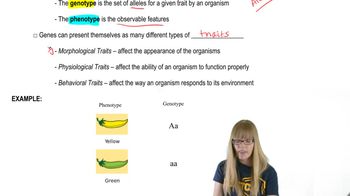Which of the examples of genetic testing below are prognostic tests? Which are diagnostic?
ASO testing determines that an individual is a carrier for the mutant β-globin allele (βˢ) found in sickle-cell anemia.
Does genetic analysis by ASO testing allow for detection of epigenetic changes that may contribute to a genetic disorder? Explain your answer.
 Verified step by step guidance
Verified step by step guidance
Verified video answer for a similar problem:
Key Concepts
ASO Testing

Epigenetics

Genetic Disorders

Which of the examples of genetic testing below are prognostic tests? Which are diagnostic?
DNA sequencing of a breast tumor reveals mutations in the BRCA1 gene.
What are the advantages of using a restriction enzyme whose recognition site is relatively rare? When would you use such enzymes?
In 1975, the Asilomar Conference on Recombinant DNA was organized by Paul Berg, a pioneer of recombinant DNA technology, at a conference center at Asilomar State Beach in California. Physicians, scientists, lawyers, ethicists, and others gathered to draft guidelines for safe applications of recombinant DNA technology. These general guidelines were adopted by the federal government and are still in practice today. Consider the implications of recombinant DNA as a new technology. What concerns might the scientific community have had then about recombinant DNA technology? Might those same concerns exist today?
Maternal blood tests for three pregnant women revealed they would be having boys, yet subsequent ultrasound images showed all three were pregnant with girls. In each case Y chromosome sequences in each mother's blood originated from transplanted organs they had received from men! This demonstrates one dramatic example of a limitation of genetic analysis of maternal blood samples. What kind of information could have been collected from each mother in advance of these tests to better inform physicians prior to performing each test?
